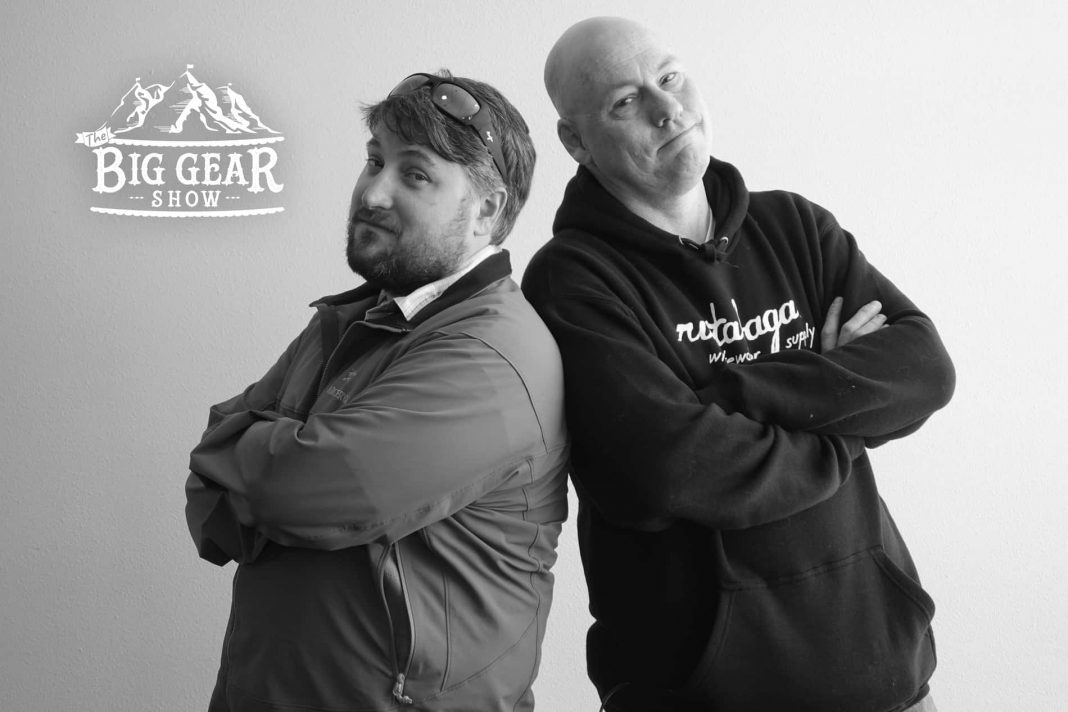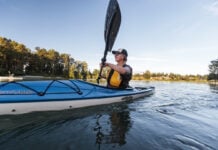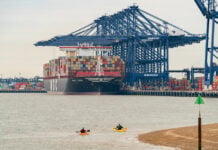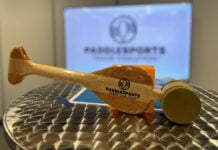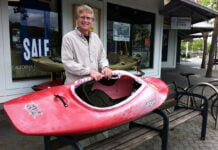Just three weeks after Outdoor Retailer’s Summer Market and three days after ICAST, the paddlesports industry is welcoming a new show to the summer circuit: The Big Gear Show.
The new trade-and-consumer show debuts July 21 to 25, 2020, back at the Salt Palace Convention Center in Salt Lake City, Utah. It will showcase hardgoods from the paddling, biking, camping, and climbing industries, with planned pre-show excursions and a designated consumer day.
The Big Gear Show is the brainchild of Sutton Bacon and Darren Bush, co-founders of Paddlesports Retailer, the paddling industry’s tradeshow for brands, retailers and manufacturers. Bush is the owner and operator of Madison, Wisconsin’s Rutabaga Paddlesports, and Bacon is the former CEO of the Nantahala Outdoor Center.
Today, the two confirmed to Paddling Business and Paddling Magazine Paddlesports Retailer will leave the Cox Convention Center in Oklahoma City, where it’s been hosted in late August for the last two years. Next year, Paddlesports Retailer will become a part of The Big Gear Show.
The Big Gear Show has been endorsed by the National Biking Dealers Association as the biking industry’s official 2020 tradeshow. Approximately 450 exhibitors and representatives from 1,500 stores are expected—roughly a third of the size of Outdoor Retailer, the organizers say.
Exhibitor rates for the show range from $12 to $15 per square foot, roughly half the cost of some tradeshows, say organizers. Organizers have also promised to limit booth sizes for larger brands and offer VIP placements for start-ups to democratize floorspace and prioritize innovation.
Bush and Bacon answer Paddling Business questions about The Big Gear Show below.
How did the idea for The Big Gear Show come about?
Bacon: We believe Paddlesports Retailer was the right show at the right time for paddlesports, and we’re very proud of it. For three years, our primary objective was to serve the paddling community. To continue that, we’re starting The Big Gear Show and folding Paddlesports Retailer into the show.
We received a lot of really good feedback from retailers and exhibitors—it was universally positive. However, the one piece of consistent feedback we were unable to address in the show’s existing format was exhibitors wanted to see more buyers, and retailers wanted to see more brands. More hardgoods brands specifically. Partnering with other industry segments creates more sustainability and will support those needs better.
Is The Big Gear Show replacing Paddlesports Retailer?
Bacon: Paddlesports Retailer will take place at the Big Gear Show. Each segment—paddling, camping, biking, climbing—will be anchored by what we’re calling a “basecamp” with its own look and identity. We’ll have an indoor experiential demo area, multiple paddle tanks, buyer’s area, media area and new product showcase. At the end of the day, we’re all selling to the same consumer, and the cross-pollination of new ideas, innovation and best practices will be good for attendees.
You two just came off a successful year at Paddlesports Retailer, which has been building momentum for two years in Oklahoma City—why the shift?
Bacon: First and foremost, we’re paddlers. Even though The Big Gear Show is broader than paddlesports, it has a laser focus on paddling. Joining forces with other industries, many of which have more positive trends than paddlesports in terms of growth and sales, will be a stronger and sustainable platform—and home—for paddlesports than a paddlesports-only show.
Bush: A friend of mine with an inflatable paddleboard company opened nine new dealers last year, and five of them were bike shops. I recently asked a Petzl rep, how many bike shops sell Petzl? He said, “I don’t know.” Duh, right. They make a light for a caving helmet; you think that’s not adaptable to a bike helmet? There’s a lot of places where outdoor brands and bike brands don’t cross over. More than I would think. This is a chance for paddlesports to get their foot in the door at bike shops. There’s just so much opportunity for cross-pollination here.
What differentiates the Big Gear Show from other outdoor shows?
Bacon: The Big Gear Show is strictly focused on hardgoods and the needs of hardgoods makers and buyers. There are already great tradeshows on soft goods. But we’re focused exclusively on gear. We’re also doing this at a fraction of the expense of other tradeshow options. Our exhibitor fees may have over 50 percent savings of some tradeshows. We had very affordable price points at Paddlesports Retailer and we’ll continue those.
Also, there will be a consumer day; we feel like they’re a missing component in the dialogue around the industry. Inviting consumer input into the big tent creates an unparalleled environment to showcase products, especially for small brands. It’s really about innovation and is a way for brands to engage directly with the consumer. And it will be impactful from the media exposure perspective.
The Big Gear Show is taking place the week after ICAST. With so many boat brands at ICAST, do you anticipate a conflict?
Bacon: No. We intentionally scheduled so we would be following ICAST and so we don’t anticipate conflicting with ICAST.
Bush: I talked to a few folks who are participating in both, they said it’s actually good because their truck is packed, and they won’t even unpack, they’ll just go straight there.
What will the paddlesports demos look like?
Bacon: We’re working on the demo concept and hoping to publish more information in the next month. There will be several opportunities to demo. First, there will be paddle tanks, but they will be functional rather than fun—meaning no dog jumping competitions and models paddling SUP boards promoting things. We believe the traditional demo paddle on the first day of the show is not the best experience. We’re trying to address that—see it, try it, then buy it. We’re also working with the state of Utah and will have guided and unguided excursions, including paddlesports, within an hour one or two of Salt Lake City.
Why did you choose Salt Lake City? Do you anticipate any blowback from the outdoor industry after Outdoor Retailer’s decision to leave Utah in protest of its public lands controversy?
Bush: Most of the land use issues are not state driven; they are federal. Utah Congressman Rob Bishop is the one who wants to take all the public lands back, and that’s not going to happen—it’s a political stunt. There are political challenges around land use in Utah, but that’s also true of Colorado, Wyoming, Montana, and every other western state. It’s not unique to Utah. The people in Salt Lake City overwhelmingly support federal public lands, and they’re the ones who got hurt by [the outdoor industry] leaving. I think it’s not as much of a debate if you look at it with a critical eye.
How do you think Outdoor Retailer will react to a show so close in focus, timing and format?
Bacon: Darren and I both served on the Outdoor Industry Association (OIA) and we have many friends there and at Emerald [the event organizer of Outdoor Retailer]. We have the utmost respect for OIA and Emerald. I can’t speak for them as to their reaction. We feel like we’re bringing something new to the market because we see a need for a show like this focused on hardgoods. I don’t see it as a zero-sum game; we’re all about building the industry, and open to collaboration. We are laser-focused on the needs of the hard buyers—the owners and the stores where the staff walk the talk, bring in novices and send out enthusiasts, and also innovative gears brands, the innovators, the start-ups, the domestic manufacturers, and the gear makers—that’s our focus.
Who came up with the name?
Bush: It’s what it is!
Bacon: We’d been talking about it for some time, and it just stuck. It’s self-explanatory.
Get more details on The Big Gear Show in the press release here or visit www.thebiggearshow.com.



